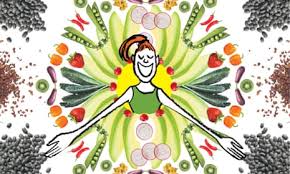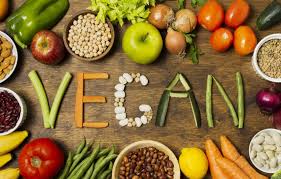Navigating Veganism: A Comprehensive Guide 
Veganism is more than just a diet; it’s a lifestyle choice that advocates for the ethical treatment of animals, environmental sustainability, and health benefits. Transitioning to a vegan lifestyle can be an enriching experience, but it may also present challenges. This guide aims to help you navigate the complexities of veganism, from understanding the philosophy behind it to practical tips for making the transition.
Understanding Veganism
At its core, veganism is the practice of abstaining from the use of animal products. This includes not only food but also clothing, cosmetics, and other consumer goods. The philosophy behind veganism is rooted in three main principles:
- Ethical Considerations: Many people choose veganism out of concern for animal rights. The belief is that animals should not be exploited or harmed for human purposes.
- Environmental Impact: Animal agriculture is a significant contributor to climate change, deforestation, and water pollution. Adopting a vegan lifestyle can reduce one’s ecological footprint.
- Health Benefits: A well-planned vegan diet can provide numerous health benefits, including lower risks of heart disease, high blood pressure, type 2 diabetes, and certain cancers.
Making the Transition
Transitioning to a vegan lifestyle can be a gradual process or a swift change, depending on individual preferences. Here are some strategies to consider:
- Educate Yourself: Knowledge is power. Read books, watch documentaries, and follow reputable vegan blogs to understand the impacts of animal agriculture and the benefits of a plant-based diet.
- Start Slow: If going fully vegan feels overwhelming, consider starting with “Meatless Mondays” or reducing dairy consumption. Gradually replace animal products with plant-based alternatives.
- Experiment with New Foods: Explore a variety of fruits, vegetables, grains, legumes, nuts, and seeds. This not only diversifies your diet but also makes the transition more enjoyable.
- Plan Your Meals: Meal planning can help you avoid the temptation of reverting to non-vegan options. Create a weekly meal plan that includes balanced, nutritious meals.
- Find Alternatives: The market is flooded with vegan alternatives for meat, dairy, and eggs. Explore brands that offer plant-based substitutes to make your transition smoother.
- Join a Community: Connecting with other vegans can provide support, inspiration, and resources. Consider joining local vegan groups, online forums, or social media communities.
Nutritional Considerations
A vegan diet can be nutritionally complete, but it’s essential to be mindful of certain nutrients that may require attention:
- Protein: Ensure you’re consuming enough protein from sources like lentils, chickpeas, tofu, tempeh, quinoa, and nuts.
- Vitamin B12: This vitamin is primarily found in animal products. Consider fortified foods or a B12 supplement.
- Iron: Plant-based sources of iron (like beans and leafy greens) are less easily absorbed than those from meat. Pair these foods with vitamin C-rich foods (like citrus fruits) to enhance absorption.
- Calcium: Look for fortified plant milks and juices, as well as leafy greens, tofu, and almonds.
- Omega-3 Fatty Acids: Consider incorporating flaxseeds, chia seeds, walnuts, or algae-based supplements to ensure adequate omega-3 intake.
- Vitamin D: Depending on your sun exposure, you may need to take a vitamin D supplement or consume fortified foods.
Eating Out and Social Situations
Eating out as a vegan can sometimes be challenging, but with a bit of preparation, you can navigate social situations effectively:
- Research Restaurants: Many restaurants now offer vegan options. Check menus online before you go out to ensure there are suitable choices.
- Communicate: Don’t hesitate to inform servers about your dietary preferences. Many restaurants are accommodating and can modify dishes for you.
- Host Gatherings: When hosting, prepare a vegan meal that everyone can enjoy. This not only makes it easier for you but also introduces your friends to delicious vegan cuisine.
- Bring Your Own Food: If you’re unsure about vegan options at social events, bring your own dish to share. This way, you’ll have something you enjoy while also introducing others to vegan fare.
Overcoming Challenges
Transitioning to veganism can come with its own set of challenges. Here are some common hurdles and tips on how to overcome them:
- Social Pressure: Family gatherings and social events can sometimes be uncomfortable. Stay confident in your choices and, if necessary, engage in conversations about your reasons for going vegan.
- Cravings: If you miss certain non-vegan foods, look for vegan versions or try to replicate the flavors with plant-based ingredients.
- Misconceptions: Be prepared to address misconceptions about veganism, whether it’s about nutrition, ethics, or the supposed blandness of vegan food. Share your positive experiences and delicious recipes.
- Time and Convenience: Many people worry that vegan cooking is time-consuming. Explore quick recipes and meal prep strategies to make the process easier.
Exploring Veganism Beyond Diet
Veganism extends beyond dietary choices. Here are other aspects to consider:
- Cruelty-Free Products: Look for cosmetics, skincare, and household products that are labeled cruelty-free and vegan. Many brands now offer ethical alternatives.
- Sustainable Fashion: Consider the impact of your clothing choices. Look for brands that focus on sustainable practices and avoid animal-derived materials.
- Advocacy: If you feel passionate about animal rights and environmental issues, consider getting involved in advocacy work. Volunteer with animal shelters, participate in campaigns, or educate others about veganism.
Conclusion
Navigating veganism is a personal journey that can vary widely from one individual to another. By understanding the principles behind veganism, planning your transition, and connecting with the vegan community, you can create a fulfilling lifestyle that aligns with your values. Whether you’re in it for ethical reasons, health benefits, or environmental concerns, embracing veganism can lead to a more compassionate and sustainable way of living. Remember, every step you take contributes to a larger movement toward a kinder, healthier world.

